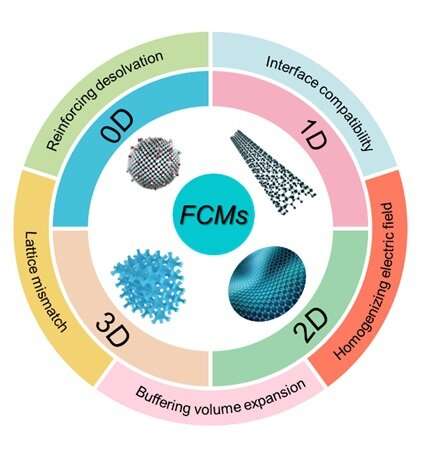Functional carbon materials for addressing dendrite problems in metal batteries

Metal batteries, with active metals as anodes, are considered as one of the most promising solutions to achieve the energy upgrade of battery technologies, yet their practical applications are hindered by the dendrite problems to a great degree. Functional carbon materials (FCMs) with tuned texture and properties have been demonstrated to be of great potentials in protecting metal anodes from dendrite growth by providing metal deposition sites, guiding the ion flux, shielding dendrites, and so on.
This review by a group led by Dr. Qi Yang and Prof. Jieshan Qiu at Beijing University of Chemical Technology, China, has addressed the intrinsic superiorities of FCMs in tackling the dendrite problems from perspectives of surface chemistry, multi-dimensional carbon material engineering, and defects engineering.
The surface chemistry of FCMs is shown to be one of the key issues in terms of optimizing the interface compatibility between metal anodes and electrolytes and stabilizing the interface environment by accelerating the desolvation. The authors proposed a new concept of the multi-dimensional carbon material engineering with a focus on methodologies of regulating/redistributing ion flux, homogenizing electric field, and alleviating volume expansion.
This review has tried to clarify the long-standing debate about the impacts of the defects in FCMs to metal dendrite protection. Finally, the authors have outlined the challenges and perspectives regarding the design and fabrication of smart FCMs for practical applications in metal batteries.
The research was published in Science China Chemistry.
More information: Qi Yang et al, Functional carbon materials addressing dendrite problems in metal batteries: surface chemistry, multi-dimensional structure engineering, and defects, Science China Chemistry (2022). DOI: 10.1007/s11426-022-1397-2
Provided by Science China Press





















